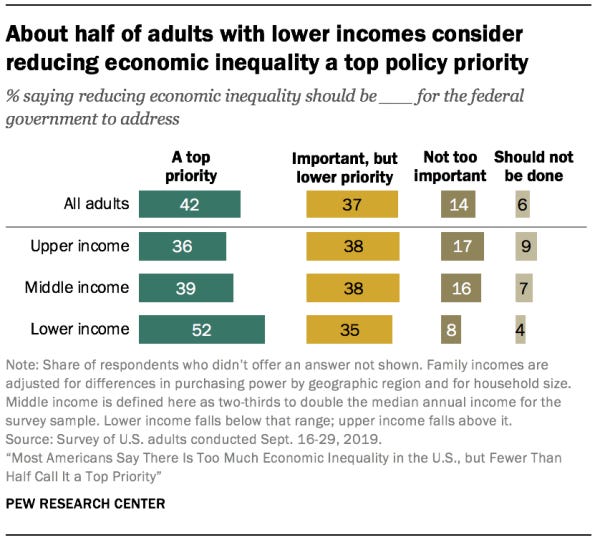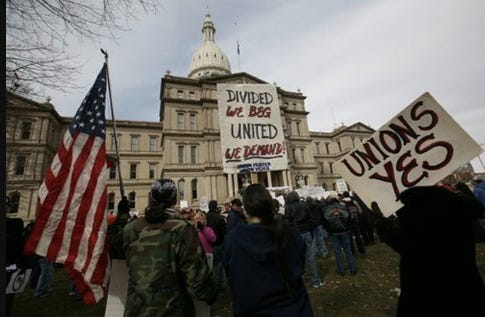Reducing Wealth Inequality and Ending Poverty are Underprioritized by American Politicians Despite Popularity. Poor and Working-Class Solidarity and Unionization Can Help.
Despite tens of millions living in poverty while corporate CEOs make record profits, politicians underprioritize ending poverty and closing the racial wealth gap.
Despite 37.3 million Americans living in poverty in 2020, something most poor people understandably consider a top priority, corporations are making record profits and politicians aren’t prioritizing policies like raising the minimum wage completely above the poverty line, taxing the rich, ending homelessness, cancelling student debt, and providing all people with healthcare, paid for by taxes.
What does it say about our country’s democracy and human rights record that even though most people support policies like this, our politicians never seem to be able to pass bills helping those struggling most?
When analyzing the racial wealth gap, how we have the highest incarceration rate in the world, and extreme amounts of corporate money are spent on political campaigns, it seems quite clear that this is the continued legacy of America’s racist past we’ve yet to collectively confront in a meaningful way.
Is it any surprise that the past two Presidents had approval ratings hovering around 40%, Congress is disapproved of by 82%, and the Supreme Court approval rating sits at 36%?
I don’t profess to know all of the answers, but clearly something is wrong when you have a country with extreme wealth inequality (the median income is just $35,000 and 50 people are worth as much as 160 million) and policies supported by a majority of people consistently don’t pass. It’s hard to blame people for being frustrated and seeing the system as rigged when considering these disparities.
Unfortunately when it comes to poverty related issues, most are privileged enough to not be in that position themselves so it never seems to be a top priority, as evidenced by the cover photo. But as opinion polls also consistently show on poverty-related issues, it’s not for a total lack of care - it really does seem to come down to the extreme influence exerted by those with the most money and politicians inability to pass the policies that would provide comprehensive, lasting relief.
Outside of electoralism, small signs of progress are emerging. Workers at large corporations like Starbucks and Amazon are beginning to unionize and overall union representation petitions are up 57% from this time last year. It’s this kind of solidarity that shows real potential for workers to democratically achieve the pay and benefits they deserve. That’s why there’s a long history of corporate executives doing everything they can to divide workers against each other to prevent unionization. These tactics are still employed today, as evidenced by Amazon’s union busting in Staten Island and Elon Musk’s union busting threats at Tesla a few years ago.
Without the workplace democracy unions provide, workers across the country have little to no say over poverty level wages, long working hours, lack of adequate sick leave and vacation time, lack of employer provided healthcare, among other potential benefits wealthy corporations can certainly afford to pay. It isn’t a coincidence corporations spend millions trying to persuade, and even sometimes intimidate, workers away from realizing what their collective democratic voice can achieve.
MLK Jr. is one of America’s most revered historical political figures today. Every year on his birthday, people across the political spectrum lift up his legacy as one to be revered. While most fondly remember his “I Have A Dream” speech as inspiration, far fewer focus on the Poor People’s Campaign he organized and his opposition to militarism abroad. As ever-increasing yearly military and police budgets since then demonstrate, despite the Black Lives Matter movements calls to redistribute funds to community care instead, the American government still seems more focused on policing the poor than redistributing wealth to lift them out of their subjugated societal position.
These issues are intersectional and intertwined. Whether it be racism, classism, sexism, or militarism, America is still facing the same issues Dr. King spoke about decades ago.
Until the multi-racial poor and working-class stand-in-solidarity to demand politicians and corporate CEOs stop ignoring the popular will of the people and finally shift their focus from appeasing the rich to uplifting those most disadvantaged by the various systems of oppression still facing us today, we will have yet to realize his Dream that so many politicians proclaim to wholeheartedly support.



Great stuff man - hope you're doing well. Appreciate your perspective.